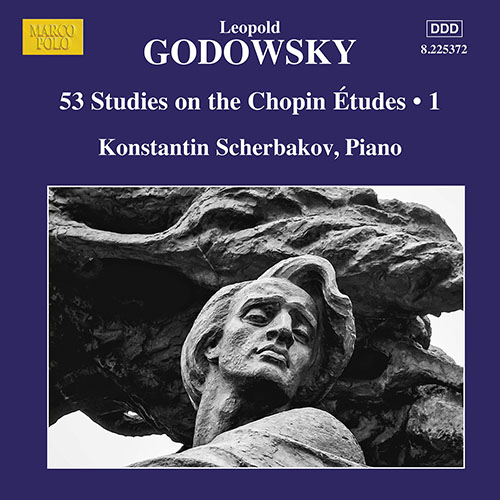GODOWSKY, L.: Piano Music, Vol. 14 - 53 Studies on the Chopin Études, Vol. 1 (Scherbakov)
Leopold Godowsky wrote his first Studies on the Chopin Études when he was barely 23 years old, and the complete cycle took some 20 years to finish. It remains one of the most extraordinary and technically demanding of all such works. It offered Godowsky—one of the greatest virtuosi of his age, but a haphazard teacher—an opportunity to resolve his innovative theories of keyboard technique. His exploration of developing the left hand in these studies remains revolutionary, and his ambition of ‘furthering the art of pianoforte playing’, triumphantly vindicated.

Swiss-Russian pianist Konstantin Scherbakov is one of today’s most versatile and accomplished artists. Renowned for his profound artistry and technical brilliance, he has recorded an extraordinary 50 albums, including the complete solo piano works of Godowsky, Shostakovich and Respighi, as well as the piano/orchestral works of Arensky, Medtner, Tchaikovsky, Scriabin and Respighi. His critically acclaimed recordings include Liszt’s transcriptions of Beethoven’s symphonies for Naxos, with the Ninth Symphony earning the prestigious Preis der Deutschen Schallplattenkritik in 2005.
Scherbakov has captivated audiences in 35 countries across Europe, Asia, the Middle East, the Americas, South Africa and New Zealand. He has been a guest at leading international festivals, including Salzburg, Lucerne, Klavier-Festival Ruhr, Schubertiade Feldkirch and Kissinger Sommer. With an extraordinary repertoire exceeding 50 concertos, he has collaborated with over 70 orchestras under the direction of luminary conductors such as Rudolf Barshai, Kirill Petrenko, Nello Santi, Christian Thielemann and Yuri Simonov.
A highly sought-after educator, Scherbakov is a professor at the Zurich University of the Arts and conducts masterclasses worldwide. He is a distinguished juror at major international competitions, including the Busoni in Bolzano, Liszt in Weimar, and ARD in Munich. Scherbakov’s legacy continues to inspire as he bridges tradition and innovation, cementing his place among the most significant pianists of our time.

Of Polish-Jewish heritage, Leopold Godowsky was born in Vilnius on 13 February 1870 and died in New York on 21 November 1938. He received very little piano tuition but nevertheless displayed prodigious talent as a self-taught pianist and from a young age toured Europe and America, even coming under the patronage of Saint-Saëns.
Godowsky began teaching in New York in 1890, and over the next decade taught in Philadelphia and Chicago. In 1891 he married Freda Saxe and took American citizenship.
Many writers attribute an important concert Godowsky gave in Berlin during December 1900 as the source of renewed enthusiasm in Europe for his consummate virtuosity. He transferred his base to Europe thereafter until 1914, succeeding Emil von Sauer and Ferruccio Busoni at the Vienna Academy of Music.
At this point Godowsky’s original compositions included various piano solos. Transcriptions and arrangements, for which he became perhaps better known, had early on emphasised Chopin. Returning to the United States during the First World War, Godowsky subsequently toured East Asia inspiring one of his best-known compositions, the Java Suite (1925).
A stroke in 1930 ended Godowsky’s concert career and unfortunately further personal tragedy clouded his final years. Some idea of Godowsky’s pianism can be obtained from the many recordings and piano rolls he made between 1913 and 1930.
































